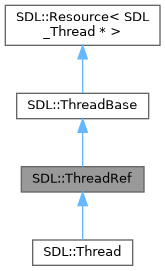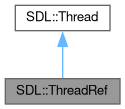Semi-safe reference for Thread.


Public Member Functions | |
| ThreadRef (ThreadParam resource) noexcept | |
| Constructs from ThreadParam. More... | |
| ThreadRef (ThreadRaw resource) noexcept | |
| Constructs from ThreadParam. More... | |
| constexpr | ThreadRef (const ThreadRef &other) noexcept=default |
| Copy constructor. | |
| ~ThreadRef () | |
| Destructor. | |
| constexpr | Thread (std::nullptr_t=nullptr) noexcept |
| Default ctor. | |
| constexpr | Thread (const ThreadRaw resource) noexcept |
| Constructs from ThreadParam. More... | |
| constexpr | Thread (const Thread &other) noexcept=default |
| Copy constructor. | |
| constexpr | Thread (Thread &&other) noexcept |
| Move constructor. | |
| constexpr | Thread (const ThreadRef &other)=delete |
| constexpr | Thread (ThreadRef &&other)=delete |
| Thread (ThreadCB fn, StringParam name) | |
| Default ctor. | |
| Thread (ThreadFunction fn, StringParam name, void *data) | |
| Create a new thread with a default stack size. More... | |
| Thread (PropertiesParam props) | |
| Create a new thread with with the specified properties. More... | |
 Public Member Functions inherited from SDL::Thread Public Member Functions inherited from SDL::Thread | |
| constexpr | Thread (std::nullptr_t=nullptr) noexcept |
| Default ctor. | |
| constexpr | Thread (const ThreadRaw resource) noexcept |
| Constructs from ThreadParam. More... | |
| constexpr | Thread (Thread &&other) noexcept |
| Move constructor. | |
| constexpr | Thread (const ThreadRef &other)=delete |
| constexpr | Thread (ThreadRef &&other)=delete |
| Thread (ThreadCB fn, StringParam name) | |
| Default ctor. | |
| Thread (ThreadFunction fn, StringParam name, void *data) | |
| Create a new thread with a default stack size. More... | |
| Thread (PropertiesParam props) | |
| Create a new thread with with the specified properties. More... | |
| ~Thread () | |
| Destructor. | |
| constexpr Thread & | operator= (Thread &&other) noexcept |
| Assignment operator. | |
| constexpr ThreadRaw | get () const noexcept |
| Retrieves underlying ThreadRaw. | |
| constexpr ThreadRaw | release () noexcept |
| Retrieves underlying ThreadRaw and clear this. | |
| constexpr auto | operator<=> (const Thread &other) const noexcept=default |
| Comparison. | |
| constexpr | operator bool () const noexcept |
| Converts to bool. | |
| constexpr | operator ThreadParam () const noexcept |
| Converts to ThreadParam. | |
| void | Detach () |
| Let a thread clean up on exit without intervention. More... | |
| const char * | GetName () const |
| Get the thread name as it was specified in Thread.Thread(). More... | |
| ThreadID | GetID () const |
| Get the thread identifier for the specified thread. More... | |
| void | Wait (int *status) |
| Wait for a thread to finish. More... | |
| ThreadState | GetState () const |
| Get the current state of a thread. More... | |
Additional Inherited Members | |
 Static Public Member Functions inherited from SDL::Thread Static Public Member Functions inherited from SDL::Thread | |
| static void | SetCurrentPriority (ThreadPriority priority) |
| Set the priority for the current thread. More... | |
 Protected Member Functions inherited from SDL::Thread Protected Member Functions inherited from SDL::Thread | |
| constexpr | Thread (const Thread &other) noexcept=default |
| Copy constructor. | |
| constexpr Thread & | operator= (const Thread &other) noexcept=default |
| Assignment operator. | |
Constructor & Destructor Documentation
◆ ThreadRef() [1/2]
|
inlinenoexcept |
- Parameters
-
resource a ThreadRaw or Thread.
This does not takes ownership!
◆ ThreadRef() [2/2]
|
inlinenoexcept |
- Parameters
-
resource a ThreadRaw or Thread.
This does not takes ownership!
Member Function Documentation
◆ Thread() [1/3]
|
inlineexplicitconstexprnoexcept |
- Parameters
-
resource a ThreadRaw to be wrapped.
This assumes the ownership, call release() if you need to take back.
◆ Thread() [2/3]
|
inline |
These are the supported properties:
prop::thread.CREATE_ENTRY_FUNCTION_POINTER: an ThreadFunction value that will be called at the start of the new thread's life. Required.prop::thread.CREATE_NAME_STRING: the name of the new thread, which might be available to debuggers. Optional, defaults to nullptr.prop::thread.CREATE_USERDATA_POINTER: an arbitrary app-defined pointer, which is passed to the entry function on the new thread, as its only parameter. Optional, defaults to nullptr.prop::thread.CREATE_STACKSIZE_NUMBER: the size, in bytes, of the new thread's stack. Optional, defaults to 0 (system-defined default).
SDL makes an attempt to report prop::thread.CREATE_NAME_STRING to the system, so that debuggers can display it. Not all platforms support this.
Thread naming is a little complicated: Most systems have very small limits for the string length (Haiku has 32 bytes, Linux currently has 16, Visual C++ 6.0 has nine!), and possibly other arbitrary rules. You'll have to see what happens with your system's debugger. The name should be UTF-8 (but using the naming limits of C identifiers is a better bet). There are no requirements for thread naming conventions, so long as the string is null-terminated UTF-8, but these guidelines are helpful in choosing a name:
https://stackoverflow.com/questions/149932/naming-conventions-for-threads
If a system imposes requirements, SDL will try to munge the string for it (truncate, etc), but the original string contents will be available from Thread.GetName().
The size (in bytes) of the new stack can be specified with prop::thread.CREATE_STACKSIZE_NUMBER. Zero means "use the system default" which might be wildly different between platforms. x86 Linux generally defaults to eight megabytes, an embedded device might be a few kilobytes instead. You generally need to specify a stack that is a multiple of the system's page size (in many cases, this is 4 kilobytes, but check your system documentation).
Note that this "function" is actually a macro that calls an internal function with two extra parameters not listed here; they are hidden through preprocessor macros and are needed to support various C runtimes at the point of the function call. Language bindings that aren't using the C headers will need to deal with this.
The actual symbol in SDL is SDL_CreateThreadWithPropertiesRuntime, so there is no symbol clash, but trying to load an SDL shared library and look for "Thread.Thread" will fail.
Usually, apps should just call this function the same way on every platform and let the macros hide the details.
- Parameters
-
props the properties to use.
- Postcondition
- an opaque pointer to the new thread object on success.
- Exceptions
-
Error on failure.
- Since
- This function is available since SDL 3.2.0.
- See also
- Thread.Thread
- Thread.Wait
◆ Thread() [3/3]
|
inline |
This is a convenience function, equivalent to calling Thread.Thread with the following properties set:
prop::thread.CREATE_ENTRY_FUNCTION_POINTER:fnprop::thread.CREATE_NAME_STRING:nameprop::thread.CREATE_USERDATA_POINTER:data
Note that this "function" is actually a macro that calls an internal function with two extra parameters not listed here; they are hidden through preprocessor macros and are needed to support various C runtimes at the point of the function call. Language bindings that aren't using the C headers will need to deal with this.
Usually, apps should just call this function the same way on every platform and let the macros hide the details.
- Parameters
-
fn the ThreadFunction function to call in the new thread. name the name of the thread. data a pointer that is passed to fn.
- Postcondition
- an opaque pointer to the new thread object on success.
- Exceptions
-
Error on failure.
- Since
- This function is available since SDL 3.2.0.
- See also
- Thread.Thread
- Thread.Wait
The documentation for this struct was generated from the following file:
- SDL3pp/SDL3pp_thread.h